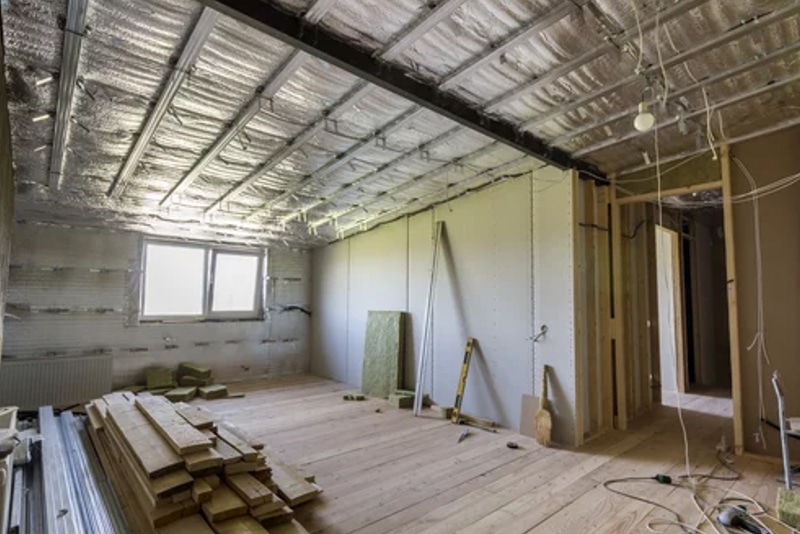Radiant Barriers
Available for any type of HVAC Service
We can help






Radiant Barriers in Northern Virginia
What is a radiant barrier?
Radiant barriers are constructed from a highly reflective material, usually aluminum or similar material that reflects heat rather than absorbing it. Radiant barriers can either be installed over existing insulation or on the roof structure. Radiant barriers offer benefits during all seasons, however the greatest return on investment is during the hotter months.
Heat naturally transfers from hot to cold. So, when it is hot outside, heat is naturally trying to transfer from the outside into the home. When it is cold outside, the heat from the house will naturally transfer out of the home to the colder environment. This heat transfer occurs in one of three ways: convection, conduction and radiant energy transfer.
Convection: This is the transfer of heat in fluids such as water and air. An example of this would be hot air rising upstairs and pushing cold air down. In many cases, you can feel the air temperature change as you walk up the stairs to the upper level.
Conduction: This is the transfer of heat within an object or from one object to another. For example if you hold an ice cube in your hand, it melts as a result of the heat being conducted from your body. When the insulation cannot hold off any more heat, the heat will then start entering the home through conduction.
Radiant: This transfer of heat does not require direct contact from the heat source to the object being heated. An example of this is the heat you feel from the sun. As the sun beats on the roof of the home, the heat will then start to radiate to the insulation and surrounding areas. Once the insulation cannot absorb any more heat, the heat will naturally start transferring into the home. Depending on where it is installed, radiant barriers will reflect the heat back out of the house before it reaches the insulation and surrounding areas.
Out of all heat transfer methods, radiant heat transfer is the most common way heat enters the home. Traditional types of insulation known as blown fiberglass, cellulose and spray foam combat convection and conduction heat transfer, however they do not combat radiant heat transfer which is why radiant barriers are the perfect solution.
Why is the upper level of the home always hotter in the summer?
One of the comfort issues we regularly hear from homeowners is the upper level of the home is too hot, and in some cases unbearable during the summer months. A radiant barrier could be the solution to address this issue. Because the roof of your home is exposed to the sun during the day, the sun will continue to build up heat in the attic space. In most homes, the first line of defense to stop this heat from getting into the home is the insulation which lies on top of the upper level ceiling. At a certain point, the insulation cannot prevent any more heat from entering the home. Once this happens, the heat will start transferring into the home (convection and conduction heat transfer)…which is one of the reasons why the upper level of home get so hot. Adding a radiant barrier will actually reflect this heat back out of the home before it makes contact with the insulation.
I already have plenty of insulation in my attic. Do I really need a radiant barrier?
Regardless of how much insulation you have in your attic, adding a radiant barrier can reduce your heating and cooling bills, plus it will keep your family much more comfortable. Honestly, if you are perfectly comfortable in the summer months, then an attic barrier may not be the best investment for you. You would see some savings, but the investment may not be worth it for you.
Will a radiant barrier be a good investment for me if I have trees all around my house?
It depends, if you have trees surrounding the property line, but not near the home, then yes, you will still receive the benefits of a radiant barrier. However, if you have large trees all around your home that keep your roof shaded on the sunny day, then a radiant barrier would probably not be your best investment. In this case, you may want us to add regular insulation to increase R-Value of your insulation in the attic, which will provide you greater benefits in the colder months.
Will the radiant barrier cook my shingles?
This is extremely unlikely. The Florida Solar Energy Center (FSEC) has conducted tests to measure the temperature of shingles above radiant barriers on hot, summery days. Depending on the color/shade of the shingles, the FSEC found the average increase of shingle temperature was only 2-5 degrees.
Will a radiant barrier void my shingle warranty?
Shingle warranties should not be subject to cancellation by the manufacturer based on having a radiant barrier installed. However, it may be a wise choice to contact the shingle manufacturer.
***Conclusion***
A radiant barrier comfort and energy saving benefits, especially for two-story homes with large roof areas exposed to the sun.
We install radiant barriers in Alexandria, Arlington, McLean, Fairfax, and all surrounding cities.

2019 Carrier President's Award
We have been awarded the 2019 Carrier President’s Award. This is Carrier’s highest honor and is presented to an elite group of Carrier Factory Authorized Dealers who have achieved excellence. We exemplify our company’s model for customer satisfaction, operational excellence, business effectiveness and delivering the best in cutting edge technology to our consumers.
- 3 Levels of Service Agreements with discounts
- Energy audits for your home or office
- We service ALL brands of heating and A/C units
Award Winning Service
Winner of Carrier’s highest honor with the 2019 Carrier Presidents Award.
Highly Trained Techs
Our technicians are trained in the latest technology to save you money and increase the life of your HVAC unit
Licence & Insured
Our service team is licensed and insured for your protection on every job we perform.
Frequently Asked Questions
When should I start considering replacing my Furnace?
The Department of Energy recommends considering replacing furnaces that are15 years or older or that are not keeping you comfortable.
